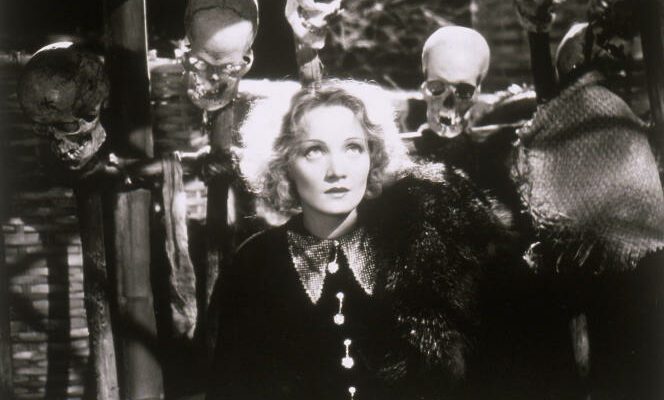CINÉ+ CLASSIC – THURSDAY, JANUARY 26 AT 8:50 P.M. – FILM
Born between the two world wars, Hollywood’s fascination with the chaos that reigned in China from the Boxer War (1899-1901) to the victory of the Chinese People’s Army (1948) lasted well beyond that. here (see The 55 Days of Beijing, by Nicholas Ray, or The Gunboat of the Yang-Tsé, by Robert Wise, released in 1963 and 1966 respectively). But, in the beginning, or almost, there was Marlene in Shanghai Express.
Released in 1932, this fourth collaboration between Josef von Sternberg and Marlene Dietrich marks a new summit in the art of the director and the actress. The first appearance of Shanghai Lily, who emerges from a limousine on the crowded platform of the Beijing railway station, dressed in black lace, brilliantly defines the space in which Sternberg wants to evolve his star, a moving world (the train) at the mercy of the environments he crosses, and most often nocturnal (the black and white of cinematographer Lee Garmes is both unfathomable and perfectly legible).
Whore with a big heart
In the deadly swarm of the civil war, another tragedy must hatch, love. On board the train are therefore Shanghai Lily, whose profession is almost explicitly stated (the Hays code still tolerates kind-hearted prostitutes), and her former lover, the British captain Doc Harvey (Clive Brook), who knew and loved as Madeleine. “It took more than one man to change my name to Shanghai Lily”she acknowledges.
The presence of another passenger, warlord Henry Chang (Warner Oland, an actor of Swedish origin who owed his appearance to incarnate both the horrible Fu Manchu and the sympathetic Charlie Chan), provokes the capture of the train and the taking of its passengers hostage (the scenario is inspired by an episode which occurred in 1923). In this situation of extreme tension, it is the women, Shanghai Lily and her Chinese colleague, Hui Fei (the marvelous Anna May Wong), who serve as bargaining chips.
The splendor of Shanghai Express is due to the perfect balance that Sternberg maintains between the melodramatic exaltation of the situations and the rigor of his staging. Its fluid compositions (the use of the crossfade here is dazzling), its handling of crowds of extras allow a film shot entirely in the studio to give the impression of the uncertainty of existence in wartime. The treatment reserved for the character of Hui Fei gives a glimpse of what Anna May Wong’s career would have been like in another Hollywood.
As for the latter, who was then barely 30 years old, she reveals a hint of doubt, of fragility, which will disappear in the imperial roles that she will hold thereafter. These almost imperceptible cracks end up making Shanghai Express a timeless movie.
Shanghai Express, film by Josef von Sternberg (EU, 1932, 80 min). With Marlene Dietrich, Anna May Wong, Clive Brook, Warner Oland.
